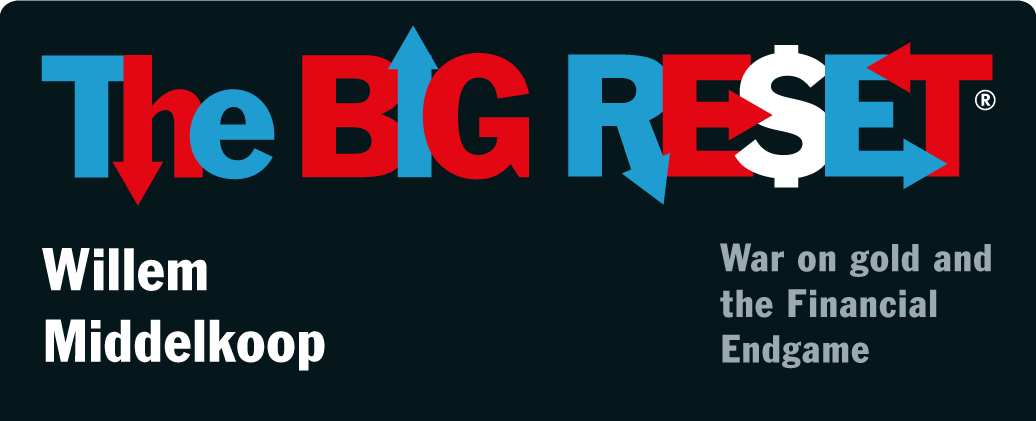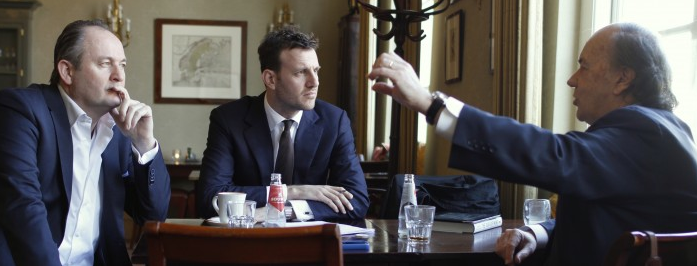Rickards agrees on Global Monetary Reset
In a recent interview with @koosjansen (www.ingoldwetrust.ch) and myself Jim Rickards agreed on the need for a global monetary reset;
Koos Jansen: Do you think there will be a collapse in the worldwide monetary system, including chaos, social unrest and bank failures because all policy makers will do too little too late?
Jim Rickards: My new book, The Death Of Money, is about the demise of the dollar. A world wide monetary collapse and the collapse of the dollar are the same thing. The dollar is the keystone of the system today, if the world loses confidence in the dollar the whole system collapses.
Koos Jansen: Do you consider it a possibility the SDR will be the new world reserve currency backed by gold, like mentioned in Willem’s book The Big Reset? And following up on that, could it be all national currencies will be floating around such an SDR?
Jim Rickards: Yes, there is a probability the SDR will be the new global reserve currency. Gold and oil would be then be priced in SDR’s. It will be used for some of the balance of payments between countries, the creation of reserves and probably the financial accounts of the world’s largest corporations. So Siemens, General Electric and IBM will produce their financial statements in SDR’s, because they’re global corporations.
Koos Jansen: But will this SDR be backed by gold at a fixed parity?
Jim Rickards: It might be, this is where it gets interesting. That is not what our global leaders want. What they want is a paper SDR to replace the paper dollar. The question is, will people go along with that? Our global leaders may have to go back to gold not because they want to but because they need to restore confidence. It can go either way. The SDR project that will replace the dollar is already in the works. If the elites get enough time, they need about ten years, they will roll out a paper SDR. If the collapse comes sooner than that they’ll have to gold, or, if they insist on a paper SDR, they’ll have to go with martial law and neo-fascism.
Koos Jansen: How will the power be distributed in Asia after the monetary reset?
Jim Rickards: It will be based on gold.
A lot of analysts look at gold as a percentage of foreign exchange reserves, I think that’s meaningless. In the US gold represents 70 % of reserves, but the US can print dollars and they don’t need euros or Swiss francs. A better way of thinking about it is the amount of gold relative to the size of an economy in terms of GDP. Russia is on par with the US. China needs to have at least 4500 tons to get on par with the US.
In Chapter 6 of my book I write about the Shanghai Cooperation Organization, it’s not a treaty but a mutual cooperation organization between primarily Asian and central Asian powers. This is the primary forum for Russia and China to cooperate and stand up against the US. Eventually there will be two empires in Asia. Russia will have an empire comprised of Russia, eastern Europe and central Asia. China will have an empire comprised of the mainland, its immediate periphery and east Asia.
Koos Jansen: If the world starts to lose confidence in the dollar, will Yellen be forced to raise interest rates like Volcker did in the early eighties?
Jim Rickards: The problem is how do you raise interest rates when 50 million Americans are on food stamps, 26 million Americans unemployed or underemployed, 11 million Americans have disability, with all due respect to people with genuine disability, a lot of the disability is abused. My point being, given an extremely weak economy, given deflationary trends, given high unemployment and declining labour force participation how on earth do you raise interest rates? However, the market will raise interest rates in a way the Fed won’t be able to control. That’s when you may see… who knows? Debt restructuring of the treasury market…
Koos Jansen: More QE?
Jim Rickards: More QE and the Fed may use more financial repression. Why haven’t interest rates gone up already? Because of financial repression.
If there is a loss of confidence and the market wants to push rates higher, the Fed will respond by trying to suppress rates by printing money, which will lead to more loss in confidence. This will show up the foreign exchange market, it will show up in the price of gold and it will show up in some interest rates.
A lot of this will happen really quickly, it wouldn’t play out in one day, but we will see gold making moves of a hundred dollars in one day. People will say it’s a bubble, of course it’s not a bubble it’s a sign of panic. Then we’ll see gold moving five hundred dollars a day.
What I look at is the price of gold; to me gold is a constant. The price of gold is just the inverse of the value of the dollar. If gold goes up, what is actually happing is that the dollar goes down. When you see the price of gold jumping up what that tells you is that the dollar is collapsing. Even if the Fed is repressing interest rates, gold will tell you when the dollar is done.
Willem Middelkoop: That’s why the price of gold has to be controlled.
Jim Rickards: Yes, but a couple of thing on that. The Fed right now wants the price of gold to be higher. The Fed’s problem today is not inflation it’s deflation. The Fed wants controlled inflation and they can’t get it. So how do you get inflation? You have to change expectations. So allowing the price of gold to go up helps to increase inflationary expectations. It can’t go too far too fast, it can’t do what we just described. But the Fed wouldn’t mind if the price of gold would go to $1400, $1500, $1600 dollars because that would get people into an inflationary mindset; trying to get them spending more dollars, borrowing more etc. That’s what the Fed wants. Where the Fed is wrong is to think that they can just dial it up or down. They did do that in 2011 when gold went to $1900, the Fed was very fearful gold would go to $2000, a big psychological threshold, so they had to push it down. Right now I don’t think the Fed is doing anything to hold price of gold down, China might be.
Koos Jansen: Was it China behind the drop in the price of gold In April 2013, or was it maybe a collaboration between the US and China? A scenario could have been: China would support the dollar and in return could buy physical gold at extremely low prices.
Jim Rickards: Look, I’ll tell you what I know and what I don’t know.
When you’re a detective and you have a dead body and are looking for the killer, you’re looking for a motive. So who benefitted from the drop in the price of gold? China – they’re the most likely party. I know for a fact that SAFE, which is a Sovereign Wealth Fund that manages the foreign exchanges reserves of the People’s Bank Of China, bought 600 tons of physical gold through June and July 2013. I know this from the Perth Mint and Chinese dealers. At this moment the gold is on the balance sheet of SAFE but this can be flipped to the PBOC’s sheet like it happened in 2009.
Whether the Chinese caused the drop price I can’t be sure, though I suspect it, but I know for sure they took advantage of it.
China right now has an interest in keeping the price low because they want to buy more. But at some point, if there will be inflation in the US, they want the price to go higher because that’s their hedge. That’s the reason they’re buying gold. All this talk about China backing the renminbi with gold is nonsense.
China has got $4 trillion dollars in reserves, their preference is a stable dollar. If the US devalues the dollar by 10 %, that’s a wealth transfer of $400 billion from China to the US. China’s hedge is gold, if the dollar would go down gold goes up.
Koos Jansen: China knows the US will need to devalue the dollar?
Jim Rickards: Correct.
Willem Middelkoop: I know wealthy Americans taking measures like getting a second passport and moving their money offshore. Do you see this happening in your surroundings?
Jim Rickards: Yes, I see it all the time. There are billionaires who build vaults in their own houses because they don’t trust Brinks.
Willem Middelkoop: What does that tell you?
Jim Rickards: It tells me that they see what I see, in some ways, but their not willing to talk about it. They’re ready for the collapse but want to milk the system in the meantime.
Click here for the full interview


